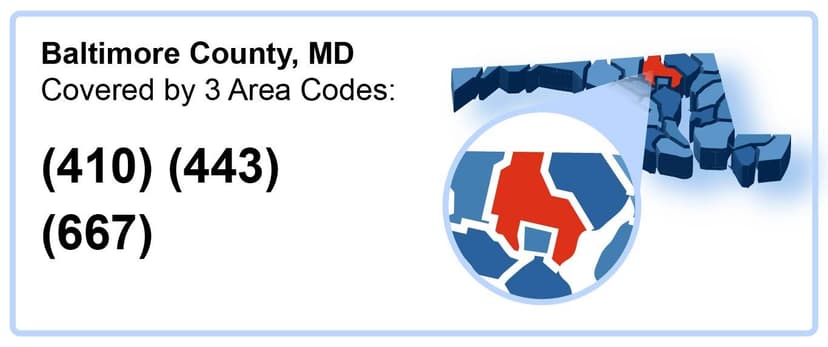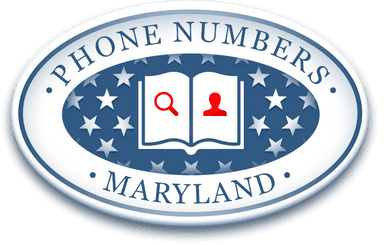What are Baltimore City Area Codes?

Area codes are the three numeric digits that identify the various numbering plan areas (NPAs) created by the North American Numbering Plan (NANP). The NANP divided the regional service territories under its jurisdiction into NPAs to simplify long-distance telephone calling. The Maryland Public Service Commission implements and manages area codes in the City of Baltimore.
The three area codes in service in Baltimore City are:
Area Code 410
Area code 410 is the telephone area code in the NANP that serves the Baltimore metropolitan area and the eastern shore of Maryland. A split of the 301 NPA in 1991 created this NPA.
Area Code 443
Area code 443 was established in 1997 as a telephone overlay code in the NANP for the 410 NPA.
Area Code 667
Area code 667 is the second telephone overlay code for the 410 NPA and became active in 2012.
What are the Best Cell Phone Plans in Baltimore City?
A 2018 survey by the National Center for Health Statistics established that cell phones had surpassed landlines as the preferred choice for telecommunication in Maryland. The survey reported that 39.4% of adults (over 18) in the state used only cell phones while about 3% used landlines solely. For residents less than 18 years, about 49.1% relied only on cell phones for telecommunication while less than 1% used only landline phones.
The City of Baltimore has excellent cell phone service from all the major phone carriers and several Mobile Virtual Network Operators (MVNOs). All four major carriers (AT&T, Sprint, T-Mobile, and Verizon) cover at least 95% of the city, with AT&T and Sprint boasting 100% coverage. The numerous MVNOs that run on the major carriers’ network infrastructure provide bundled phone services to residents in the city at more affordable prices.
Voice over Internet Protocol is a group of technologies that provides telephony services using IP networks, typically the internet. VoIP uses the internet to offer telephony services that are more flexible, efficient, and cheaper than traditional telephony services. Several companies offer VoIP services for business and residential users in Baltimore City.
What are Baltimore City Phone Scams?
Baltimore City phone scams are fraudulent acts committed against the city’s residents using telephone services including live calls, robocalls, and text messages. These acts aim to steal money and sensitive information from unsuspecting residents. Phone number searches can look up the suspicious phone numbers used for scams and return information on the registrants.
The Office of the Maryland Attorney General provides alerts and updates on prevalent phone scams in the state and receives consumer complaints. Residents can submit complaints online, by email, or call (410) 528-8662. Residents can also report scam incidents at their local Baltimore Police Department districts or to the Federal Trade Commission. Common scams in Baltimore City include:
What are Coronavirus Scams?
Fraudsters have taken advantage of the uncertainties and confusion associated with the novel coronavirus to scam city residents. There are several variations of the coronavirus scam and residents must be cautious when dealing with callers discussing the current pandemic.
Scammers impersonate health department officials to offer free test kits as well as medications and treatments. They ask their targets for personal information and health insurance details as part of the procedures for receiving the kits and medicines. In a variation of this scam, the scammers impersonate employees of the Federal Deposit Insurance Corporation (FDIC) or the Treasury Department. Under these guises, they request their targets’ personal information such as SSNs and bank account details as a precondition to receiving federal stimulus grants. Scammers are also impersonating charitable organizations and contacting residents to solicit donations. They claim the donations are for individuals, groups, and areas disproportionately affected by the coronavirus and ask for cash donations by mail, wire transfers, and gift cards.
Authorities warn city residents to be wary of these phone calls. Health Department officials do not randomly call and offer free test kits and medications. Health officials may contact residents for coronavirus tracing purposes but will never ask for confidential financial information. Employees of the FDIC or the Treasury Department will not call residents about stimulus checks. All the information they require is already available to them, and they will not reach out to residents for personal details.
While various charities solicit help for areas badly hit by the coronavirus, scammers are also taking advantage of this. Be careful who you make donations to avoid falling prey to scammers. Always make donations by check and never send cash, gift cards, or make wire transfers. The Better Business Bureau provides information on legitimate charitable organizations in Baltimore. Phone number lookup applications can ascertain if these calls are from legitimate entities.
What are SMiShing scams?
Smishing is a phishing attack carried out using text messages or SMS. A phishing attack is a fraudulent attempt to obtain sensitive information using electronic communications disguised as trustworthy. The scammers pretend to represent legitimate organizations and contact their targets via SMS text messages. The scam details depend on the impersonated organization, but a scammer employing this trick always requests the target’s personal information.
The scammer provides a link in the message that supposedly leads to a website where the target can upload their data. However, clicking on this link introduces malicious software to the victim’s smartphone that grants the scammer access to their device and even remote control.
Residents need to be wary of unsolicited texts asking for their personal information and providing links to websites. If you receive such a message, contact the agency that supposedly sent the message directly and make inquiries. Do not click on web links without confirming their authenticity. A phone number lookup can shed some light on the identity of the individual that sent the message.
What are Utility Scams?
In these scams, fraudsters impersonate officials of utility companies such as the Baltimore Department of Public Works (DPW) to defraud residents. The callers contact city residents and inform them that they will immediately disconnect the gas or electricity to their homes or businesses unless they pay off fictitious debts. The scammers typically request payment by gift cards and prepaid cards or ask for the targets’ credit card details.
Residents who receive these calls should hang up and contact their utility providers directly if they have concerns. Federal and state laws prohibit utility companies from arbitrarily disconnecting their customers’ services. Utility companies must mail multiple notices to defaulters before proceeding to disconnect their services. Do not pay or give out personal information to persons on calls you did not initiate. Reverse phone lookup services can identify if such phone calls are from legitimate utility providers. Residents can report such phone calls at their local police districts.
What are Robocalls And Spam Calls?
Robocalls use auto-dialers to make phone calls that deliver messages to multiple recipients. An auto-dialer is a computer program that dials several phone numbers with no human intervention and plays a recorded message when the call is answered. Robocalls were once the mainstay of telemarketers and political campaigns but are now commonly associated with scam calls. Scammers have co-opted robocall as a “tool of the trade” because it enables them to target multiple residents anonymously and with minimal effort. Your best options for dealing with robocalls include:
- Use the National Do Not Call Registry to restrict telephone solicitations. Phone numbers included in this registry are exempted from receiving robocalls and spam calls unless allowed by law. Any spam calls received after 31 days have elapsed can be treated as potential scam calls.
- Report any illegal robocalls you receive to the FTC online or call 1 (888) 382-1222.
- Hang up once you identify an incoming call as a robocall. Disregard instructions to connect to live operators or remove yourself from distribution lists. These prompts are only to confirm your number as active and mark your number for more spam calls.
- Use call-blocking features available in smartphones and from network operators to identify and block the numbers used for robocalls.
- Use a phone number lookup free service to identify robocall numbers and block them if other options are not cost-effective.
The FTC instructs consumers on blocking unwanted calls on any platform on its website.
How to Spot and Report Baltimore City Phone Scams?
The best defense against potential scammers is vigilance and knowledge about their tactics. Uninformed and unsuspecting residents make for easy prey as scammers continuously adapt their schemes. Applications that conduct phone lookups by name, address, and number are also useful in spotting potential phone scams. These apps are available for free and for nominal fees and can answer questions like “who called me?” and “who is this number registered to?” Information retrieved by these apps can come in handy when reporting phone scams to the authorities.
Listed below are some indicators that unverified callers are potential scammers:
- The callers claim to represent legitimate organizations and ask for confidential information such as social security numbers and credit card details. Legitimate organizations will not request personal data of their clients on phone calls not initiated by the clients.
- The callers get aggressive and try to coerce you to comply with their demands by using threats of punitive actions. Authentic callers will not use threats to get recipients to comply with their requests.
- The callers insist on irregular payment channels such as prepaid debit cards, wire transfers, and cryptocurrency. Reputable organizations do not use these payment channels, but scammers favor them for the difficulty in tracing funds sent through them.
- The callers present attractive business offers but dissuade you from doing any research or seeking the opinions of other parties. They insist on immediate commitments, usually claiming the offers are fleeting.
- The callers inform you of prizes and winnings from competitions you did not enter and request upfront payments for you to collect. Any prize that requires an upfront payment to collect is suspicious, and you cannot win in a competition you did not enter.
Baltimore City residents can contact any of the following agencies to get assistance in dealing with phone scams:
Maryland Attorney General - The Consumer Protection Division of the AG’s Office provides alerts and updates on prevalent phone scams in the state and receives consumer complaints. Residents can submit complaints online, by email, or call (410) 528-8662.
Baltimore Police Department (BPD) - The BPD is the primary law enforcement agency in the city and is committed to protecting residents from fraudulent practices. City residents can file reports on scams at their local police districts.
Baltimore City State Attorney - The Office of the State Attorney safeguards communities by prosecuting crimes committed in the city. Residents of Baltimore City can contact the State Attorney’s Office on (443) 984-6000 or by email. Alternatively, visit the Office at 120 E. Baltimore Street, Baltimore, MD 21202.
Federal Trade Commission (FTC) - The FTC regulates the marketplace and protects consumers from deceptive and fraudulent practices. It also provides initiatives to safeguard residents, such as the National Do Not Call Registry and tips on blocking unwanted calls. Residents can file complaints about illegal robocalls and fraudulent acts online or by calling 1 (888) 382-1222.
Better Business Bureau (BBB) - The BBB is one of the go-to resources for appraising the trustworthiness of a business. It also provides information and services to protect residents from potential scams.
